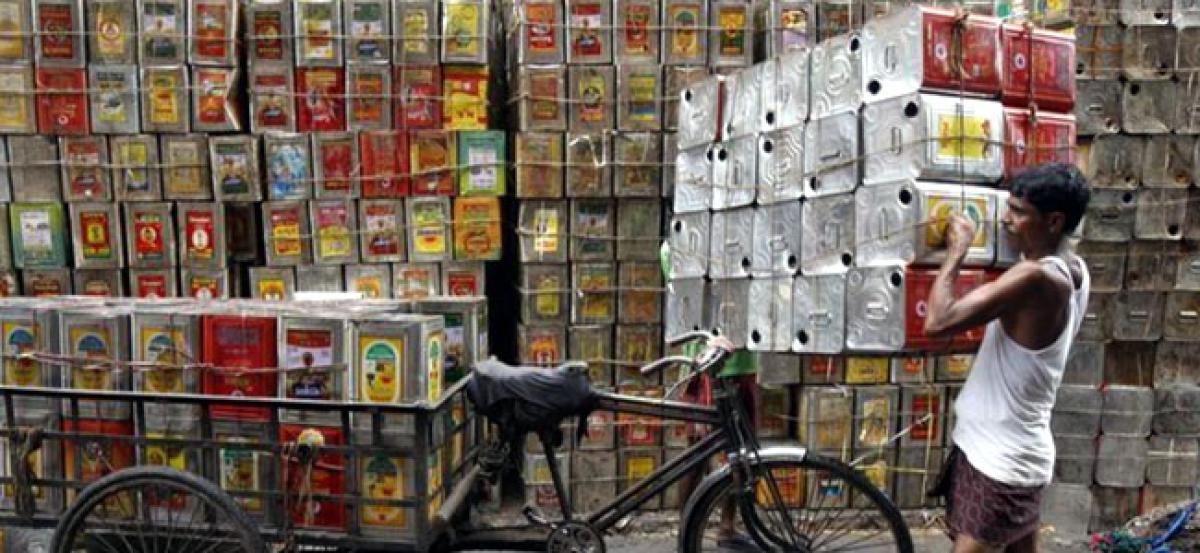Live
- MLA Mekapati Vikram Reddy express confidence in YSRCP coming back to power
- TDP MP Candidate Kesineni Chinni says Sujana's Victory as Turning Point for West Development
- AP has seen a rapid development in YSRCP regime, says YS Jagan
- Plans Underway to Bring IT Companies to Gannavaram, Assures Yarlagadda Venkatarao's Wife Gnaneshwari
- TDP Candidate Vasantha Krishna Prasad Begins Election Campaign in Mylavaram Constituency
- Chaitra Navratri Day 8: Colour of the day, and Significance
- X to Charge New Users for Engaging with Tweets to Combat Spam
- PM preferred JD(S) leaders more than BJP in Mysuru campaign?
- Celebrating Chaitra Navratri Durga Ashtami 2024: Best Wishes and Messages
- Narendra Modi thanks people of Mangaluru, Dakshina Kannada district
Just In

India\'s edible oil imports are set to fall for the first time in six years as a surge in local oilseed output cuts into overseas purchases, but intake needs to fall further to fortify the health of the market, the head of a leading importer said.
MUMBAI: India's edible oil imports are set to fall for the first time in six years as a surge in local oilseed output cuts into overseas purchases, but intake needs to fall further to fortify the health of the market, the head of a leading importer said.
The lower purchases by the world's biggest importer of vegetable oils come amid a 13 percent run-off in international crude palm oil prices this year that has also pulled down other edible oil benchmarks and kept domestic oilseed crushing in India unprofitable.
India is expected to import 14.3 million tonnes of edible oils in the year to end-October 2017, down 300,000 tonnes or 2 percent from the previous year, Dinesh Shahra, managing director of Ruchi Soya Industries, told Reuters.
To prop up domestic oilseed prices the south Asian country is likely to raise the import duty on edible oils, which would further limit overseas purchases of edible oils and help make the crushing of local oilseeds profitable again.
"An overall hike in duty on both crude and refined edible oils will promote domestic crushing of oilseeds," said Shahra, who advocates for nearly tripling crude palm oil import duties to 20 percent from an existing 7.5 percent.
Increasing crushing volumes is critical because Indian oilseed output is expected to have jumped 20 percent in 2016/17 to 38.2 million tonnes, according to the Mumbai-based Solvent Extractors Association of India (SEA).
Already, significant stocks from this year's harvest will be held over for crushing in the next season as many farmers are reluctant to sell at the current prices, Shahra said.
That is expected to have farmers shifting to more lucrative crops like cotton in the 2017/18 crop year, pulling down India's soybean planting by 10 percent from this year, he said.
"We foresee an overall reduction in soybean output (in 2017/18), but this would not affect our operations due to the carryover stock from the previous year," he said.
India is likely to start the new season with 1.8 million tonnes of soybean stocks to carry forward on Oct. 1, up more than four-fold from this season's 441,000 tonnes.
Import Outlook
India's edible oil purchases - mainly palm oil from Malaysia and Indonesia and soybean oil from Argentina and Brazil - have increased each year since 2010/11, according to SEA.
The imports in the decade to 2015/16 rose an average of 12 percent a year, making it the world's biggest importer of palm oil and soyoil. India relies on imports for 70 percent of its edible oils, up from 44 percent in 2001/02.
Palm oil accounts for more than half of India's total edible oil imports. Its purchases are likely to be 8.5 million to 8.7 million tonnes this year, compared with 8.44 million tonnes in 2015/16, Shahra said.
Imports of sunflower oil, however - perceived to be a healthier option by many Indians - could surge 33 percent to 2 million tonnes this year as it has started trading at a discount to soyoil, Shahra said.
In June the landed cost of sunflower oil was $9 a tonne lower than soyoil at Indian ports. A year ago, sunflower oil was $99 a tonne more expensive than soyoil, according to SEA data.
That means most of the drop in edible oil imports will come in soyoil purchases, which are expected to fall nearly 17 percent to 3.5 million tonnes, according to Shahra.

© 2024 Hyderabad Media House Limited/The Hans India. All rights reserved. Powered by hocalwire.com







